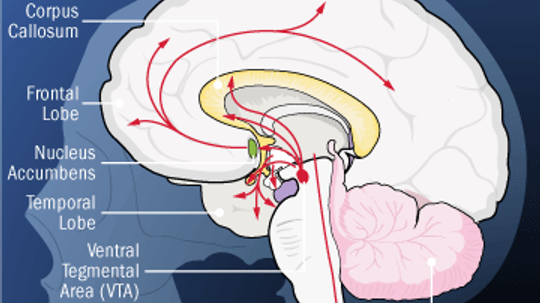Josh Clark wanted to be a professional writer since his third-grade teacher told him a short story he wrote was kind of good. He's written ever since. He's a former senior writer for HowStuffWorks and current co-host of the Stuff You Should Know podcast. Josh lives with his wife, Umi. The pair really, really enjoys traveling, solving mysteries, having pizza parties and visiting museums (both renowned and obscure). Josh has been to the real-life house that served as the Robin's Nest on "Magnum, P.I." and is on an indefinite hiatus from being a jerk.
Recent Contributions
Whether you chew to freshen your breath or blow a big bubble, you probably shouldn't swallow gum. But does it really stay in your body for seven years if you do?
By Josh Clark
Can humans live forever? No, but thanks to the discovery of the Hayflick limit, we know that cells can conceivably divide forever without dying.
By Josh Clark
According to recent studies, it appears gingers need extra anesthesia to put them under during surgery. The same gene that gives redheads their hair color is apparently responsible for the way the body handles pain.
By Josh Clark
Advertisement
Why do we help others, even if we know it will hurt us? As it turns out, the concepts of altruism and selfishness may be linked -- much more so than we thought.
By Josh Clark
There's a connection between our physical bodies and the way it responds to emotion -- but scientists aren't quite sure what it is. Could it be that happiness is little more than a series of neurochemical responses to the world around us?
By Josh Clark
Abandoned mine shafts may look romantic with their clapboarded entrances and rusting pickaxes, but they can be deadly. So who ensures that these dangerous sites are properly closed up? You may find the answer a little unsettling.
By Josh Clark
John F. Kennedy called the green beret "a symbol of excellence, a badge of courage, a mark of distinction in the fight for freedom" -- a nod to the most formidable arm of the U.S. military. The Green Berets, or Special Forces, are America's first line of defense around the world.
By Josh Clark
Advertisement
We love to play with and fuss over our pets, but have you wondered if they were having as much fun as you were? Can animals actually feel happiness?
By Josh Clark
Early explorers drove flags into the ground to claim territories. But no one bothered to float a flag in the oceans. For the most part, we peaceably shared the oceans until we realized what valuable goods could be found in their dark and murky depths.
By Josh Clark
On a planet that is 70 percent water, people don't have enough clean, safe water to drink. We're in a water crisis, and water rights are becoming a big issue. What happens if we just plain run out?
By Josh Clark
You think you'd know what happiness was -- you've felt it before, right? Not quite. It turns out that the definition of happiness pretty much depends on who's defining it.
By Josh Clark
Advertisement
Decapitation is a surefire way to deliver a quick and painless death, right? In actuality, an increasingly large body of historical and scientific evidence suggests that beheading doesn't, in fact, deliver instant death.
By Josh Clark
It happens all the time. You see an ad on television for an amazing car you've always wanted, and the monthly payments shown are actually within your financial grasp. But is that "attractive lease offer" really all it's cracked up to be?
By Josh Clark
Happiness is a wonderful thing. Unfortunately, it can also be elusive due to stress or depression. However, strategies abound that you can use to trick yourself into being happy. Ready for 10 of them?
A mass extinction on Earth is long overdue, according to population ecologists. Find out what Earth's fossil record may be telling us about our future.
By Josh Clark
Advertisement
Blushing comes from the same system that causes your fight-or-flight response. But why do your cheeks flush? Is it some kind of universal, wordless apology?
By Josh Clark
Can you watch your body after you die? Near-death out-of-body experiences have left researchers wondering if life after death exists. How do scientists explain it?
By Josh Clark
Somewhere in the world, a prisoner likely is enduring torture right now. Human rights organizations have made it their mission to report these crimes against men, women and children. Here are 10 of the most common ways torture is perpetuated in modern society.
The sea scorpion may have been the largest bug to ever live on the Earth, according to a recent find. Learn more about the giant sea scorpion.
By Josh Clark
Advertisement
Delta Force is the U.S. military's most elite tactical combat group. Yet the government refuses to deny its existence. Does a well-funded secret force that, allegedly, answers only to the president make the U.S. more secure or more vulnerable?
By Josh Clark & Sascha Bos
Formerly known as "shell shock," research into post-traumatic stress disorder began intensely after Congress requested a study of how Vietnam veterans were readjusting to civilian life in 1983. What have we learned since then about PTSD and what are the symptoms?
By Josh Clark
The ancient Chinese brought us many great innovations, including some that we take for granted in the modern world. Let's examine 10 of ancient China's greatest inventions.
By Josh Clark & Sascha Bos
We need food for sustenance and nutrition, but we also eat for pleasure. We like the way some things taste, and enjoy the experience of eating, but can food actually make us happy?
By Josh Clark
Advertisement
When you see someone else yawn, you often find yourself doing it. Yawning is contagious. But what does that have to do with the ability to feel empathy?
By Josh Clark
According to DNA research, we may all have a common ancestor, an African woman who lived thousands of years ago. How did scientists reach this conclusion? Is it even possible?
By Josh Clark & Desiree Bowie

























